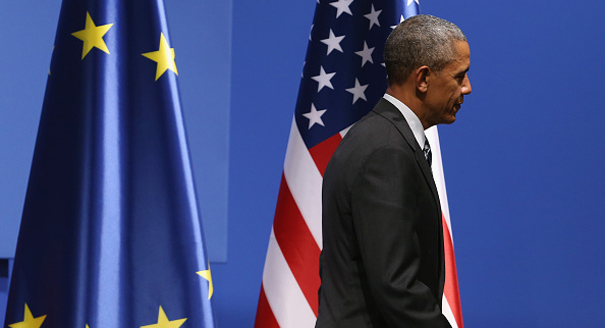The waiting has ended. Today, November 8, Americans elect a new president to enter the White House in January, bringing to a close Barack Obama’s eight-year tenure as the world’s most important leader. Whoever replaces Obama will be saddled with trying to close the extraordinarily deep divisions that characterized the election campaign as well as with redefining America’s foreign policy priorities.
Europeans had looked on with fascination but also dismay—if not a degree of sadness—at the way the campaign was conducted. And just as the Obama era nears its end, Europeans are now suddenly discovering that they are going to miss the Democratic president; that he wasn’t that bad after all.
This is a typical if not condescending European view. Europeans judge U.S. presidents on their own terms and not on the strategic ambitions or limitations set by the president—or, indeed, by the U.S. Congress. It’s as if Europeans want U.S. presidents to do the right thing without ever defining what that entails in terms of defense, security, and foreign policies or what role European leaders can play.
As soon as Obama took office in January 2009, Europeans couldn’t shower enough praise on him. That transatlantic honeymoon didn’t last long. Obama was criticized for not closing the Guantánamo Bay detention center, as he had promised during his election campaign. Not that he was going to get any help from Congress—or, for that matter, from Europeans, who were generally relieved that they didn’t have to deal with the problem of putting on trial or jailing alleged terrorists.
Just in case the matter had been forgotten, several European countries assisted the United States in the early 2000s in setting up secret detention sites in their own countries. They also cooperated in sending suspects to Guantánamo Bay or to a U.S. detention center in Afghanistan. Germany, Lithuania, Poland, and Romania—to name just a few nations—either participated in extraordinary renditions or set up special detention centers known as black sites. And several European countries joined former U.S. president George W. Bush’s coalition to invade Iraq in 2003, a decision that did untold damage to the West, not to speak of the way it almost tore NATO—and the EU—apart.
There is still an assumption among Europeans that the United States should pick up the pieces, that Washington should be the world’s and the West’s policeman. Obama changed that perception of U.S. power, and not only by withdrawing from Iraq, a move supported by the American public. In 2011, Obama also led from behind during NATO’s military operation in Libya, with Britain and France out in front. The United States provided intelligence and logistics, crucial capabilities that the Europeans continue to lack.
And when the Syrian conflict turned into a war that left in its wake millions of refugees and hundreds of thousands of casualties, the Europeans expected the United States to act in some way. But when Obama did not want his country embroiled in another war, the Europeans complained. But they didn’t act either.
That allowed Russian President Vladimir Putin to exploit the West’s weakness and lack of leadership, as confirmed by Russia’s military campaign in Syria since September 2015. Meanwhile, the Europeans have spurned any political, military, or diplomatic role and instead complain about a lack of U.S. leadership.
Complaining about U.S. leadership is a perennial preoccupation of Europeans. Yet Europeans seem to forget that the United States continues to provide the essential security umbrella for Europe’s safety, while most European countries lag behind in defense spending and improvements to their military capabilities.
Europeans also seem to forget that for all their moaning about the United States, they are not in a position to preach and gloat, because for the first time since the 1950s, the bonds that have kept the transatlantic relationship together are very weak. The West is highly vulnerable to cyberattacks, to asymmetric threats, to the inexorable rise of China, and to Russia’s hybrid warfare and disinformation machinery.
And while the United States under Obama has had other foreign policy priorities, leaders across the Atlantic, instead of pulling together to address these threats, have allowed populist and Euroskeptic movements to gnaw away at the EU’s coherence, at its unity, and at transatlanticism.
America’s new president will be faced with a Europe that with few exceptions has lost the will for leadership and ambition. The next U.S. leader cannot be expected to fix that problem alone. The United States is going to need a strong and agile Europe if the Euro-Atlantic community is to survive and to provide a beacon for those who have looked to that community for values, for support, and for democracy. At the moment, the United States and Europe are in a dangerous waiting mode. That is not a policy or strategy that will revive the West.








